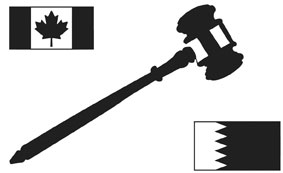Sana Alibux
Contributor
I walked into the courtroom with his parents. We all walked over to the right side of the benches in hushed silence, wondering when he was going to come in and be heard by the judge. It was late afternoon in Bahrain’s capital, Manama, in one of the main courtrooms of the Sharia Court, when I started to feel hot, sticky and claustrophobic.
I couldn’t imagine what to feel when he walked in. Should I stand, or should I remain seated and prepare for the unknown and pending verdict? I was frightened, and my palms began to feel clammy and red from pressing them against my knees in anticipation.

His mother turned to me and whispered, “Thank you for coming.” She smiled with so much radiance, but I could still see right through it and understand the fear that was boiling up inside her. She was so strong, so hopeful. His father seemed even stronger, absurdly positive even!
I didn’t quite understand how to feel that moment he walked in the courtroom with the other convicts. They were all in a line, walking toward the front of the judge’s stand, and the security guards watched as they aligned themselves in order to be called upon.
He caught my eye and gave me a little smirk. My heart filled up with love in that instant; he was so strong for being in this position, for being in front of the only person who could either make him or break him. I had always admired him for his perseverance, but that day has just become a distant memory in my mind of the day I had experienced a court session with my beloved.
I have often wondered how the laws of the Sharia court work, how they differ from the laws in Canada and in what ways each legal system represents itself in a courtroom session. Thus, I began researching both legal systems, acknowledging the various do’s and don’ts each courtroom provided.
As I had already gotten a good grasp at a live courtroom session the summer of 2009, I knew the rules revolving around the legal system in Bahrain pretty well; however, I had never experienced a live session at a courtroom in Canada. The Islamic legal system is rather complex.
It differs in many ways because most of the laws result from four sources that encompass its laws: the Holy Qu’ran, Sunnah, Ijma and Qiyas. The Holy Qu’ran is comprised of the words of God (Allah); the Sunnah comes from the words of Prophet Mohammed; and a group of religious scholars use the Ijma for specific solutions to ordeals not connected to the Qu’ran or Sunnah sources. Finally, the Qiyas refers to “analogous consideration,“ which relates to having not enough information for the case’s decision and the use of the three sources to help make the decision.
This law, in comparison to the Canadian constitution, comes from more of a religious and moral foundation. The Canadian constitution revolves around the Constitution Act of 1867. It’s grounded in democracy, and the laws derived from it are not based in religious beliefs, but are instead grounded in the British legal system.
Both courts work extremely differently. The Sharia court in Bahrain promotes certain rules that one must obey upon entering. For example, I was not allowed to cross my legs in front of the judge; when I did, he informed one of the lawyers in Arabic to come up to me and tell me to uncross my legs. And to think, I was sitting all the way in the third row!
These minor things matter a lot in the Middle East. I recently went to Ottawa with a group from York University, and on one of our tours we went to the Supreme Court of Canada. I haven’t been to a provincial courtroom, and I wasn’t lucky enough during my visit in Ottawa to witness a live courtroom session like I did in Bahrain. I did, however, manage to see the differences in the court arrangement between the courtroom I had seen in Bahrain and the Supreme Court.
The courtroom was a vision of grandeur: large and spacious, dominant red carpet flooring and rows of mahogany seating and even grander seating where the jury and judges most likely sat. Bahrain’s court was nothing in comparison. The seating was of a murky brown colour, and the judge sat alone at the top of the stand. There was a room for deliberation on the side as well. These differences between a third-world country and a North American country are only really seen when one has had the experience to entering both.
Regardless of its arrangement, Bahrain’s court still worked in a professional manner, with well-trained, educated lawyers that knew both Arabic and English and permitted proper order and silence once everyone was in the room. I never doubted their sense of professionalism. Even though the court session I attended resulted in a verdict postponed until April 2010, I was still grateful to have undergone such an experience that really brought to light how different Islamic law functioned.
Subscribe
Login
0 Comments
Oldest



